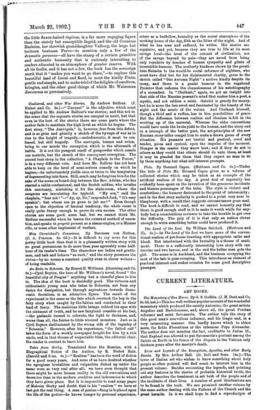Cashiered, and other War Stories. By Andrew Balfour. (J. Nisbet
and Co. 6s.)—" Unequal" is the adjective which must be applied to Mr. Andrew Balfour's war stories; and this not in the sense that the separate stories are unequal in merit, but that even in the best of the stories there are some parts where the author fails to maintain the high level on which he begins. The first story, " The Aasvogels," is, however, free from this defect, and is so grim and ghastly a sketch of the byways of war as to rise to the height of tragedy,—melodramatic, it must be con- fessed, but still tragedy. The aasvogeLs, human and avian, bring to our minds the corruption which is the aftermath of battle. It is not the pungent smell of gunpowder which assails our nostrils, but the stench of the consequent corruption. The second best story in the collection, " A Chaplain to the Forces," is in a very different vein. And here Mr. Balfour has not been able to keep on the level of semi-serious comedy on which he begins,—he unfortunately yields once or twice to the temptation of degenerating into farce. Still, much may be forgiven him for the sake of the scene on board ship between the Rev. Adrian, who has started a cabin-confessional, and the Scotch soldier, who invades this sanctuary, mistaking it for the state-room, where the surgeons are inoculating for typhoid. "My son," said the chaplain, "fear not ! "—" Ay, ay, Sir," responded Jock, " it's easy speakin'; but whaur are ye gaun to jab me ?" Even though open to the objection of farcical tendency, the whole scene is really quite funny enough to prove its own excuse. The other stories are some good, some bad, but we cannot think Mr. Balfour successful when be leaves the external method of narra- tion, and speaks in proprid persona as a steam-engine, or a Musser rifle, or some other implement of warfare.










































 Previous page
Previous page